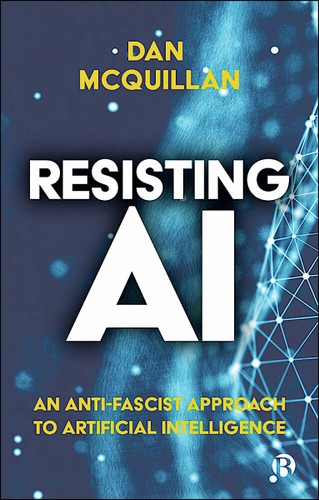Johnny reviewed Resisting AI by Dan McQuillan
A rich critique of the very core of modern AI
4 stars
This is really a long-form essay. It's very well-structured and extremely densely packed with succinct points about sociotechnological issues. In many instances, it expanded my horizon and made me question my own preoccupations regarding AI and even science at large. It's great; it gave me perspective and I learned about so many new interesting concepts that made a lot of sense in the context of AI. Off the top of my head, what stuck with me most were the ideas of "bureaucratic thoughtlessness", "states of exception", and of course, "necropolitics". I found that these are really good ways to think about and analyse AI. It goes so much deeper than the regular mainstream discourse about "AI ethics" and the like – the book is not afraid to put the hard questions on the table.
That said, I have two points of minor contention: First, I expected the second half of …
This is really a long-form essay. It's very well-structured and extremely densely packed with succinct points about sociotechnological issues. In many instances, it expanded my horizon and made me question my own preoccupations regarding AI and even science at large. It's great; it gave me perspective and I learned about so many new interesting concepts that made a lot of sense in the context of AI. Off the top of my head, what stuck with me most were the ideas of "bureaucratic thoughtlessness", "states of exception", and of course, "necropolitics". I found that these are really good ways to think about and analyse AI. It goes so much deeper than the regular mainstream discourse about "AI ethics" and the like – the book is not afraid to put the hard questions on the table.
That said, I have two points of minor contention: First, I expected the second half of the book to be about "an antifascist approach to AI", i.e. concrete calls to action that directly relate to AI as a contemporary phenomenon. In a sense, it was about that – but it was just a little too abstract for me and the sections on worker's and people's councils felt somewhat disconnected from the rest. I really would have loved to see a more elaborate version of the very last subchapter. Second, this is not a book for AI enthusiasts or for people who still need convincing that there's something fundamentally wrong with AI today. That may not have been the goal here, but it makes it a little difficult to become a "I recommend this to absolutely everyone" kind of book. In general, it's not an easy read for someone completely unfamiliar with the groundwork in this area.

